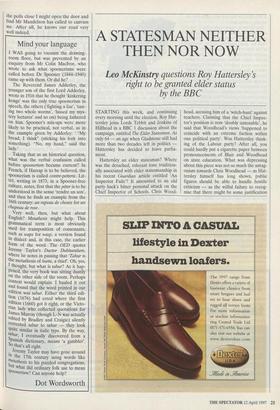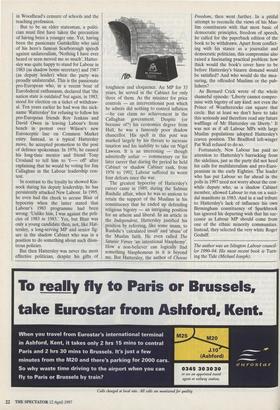A STATESMAN NEITHER THEN NOR NOW
Leo McKinstry questions Roy Hattersley's right to be granted elder status by the BBC STARTING this week, and continuing every morning until the election, Roy Hat- tersley joins Lords Tebbit and Jenkins of Hillhead in a BBC 1 discussion about the campaign, entitled The Elder Statesmen. At only 64 — an age when Gladstone still had more than two decades left in politics — Hattersley has decided to leave parlia- ment.
Hattersley an elder statesman? Where was the detached, tolerant tone tradition- ally associated with elder statesmanship in his recent Guardian article entitled 'An Inspector Fails'? It amounted to an old party hack's bitter personal attack on the Chief Inspector of Schools, Chris Wood- head, accusing him of a `witch-hunt' against teachers. Claiming that the Chief Inspec- tor's position is now 'doubly untenable', he said that Woodhead's views 'happened to coincide with an extreme faction within one political party'. Was Hattersley think- ing of the Labour party? After all, you could hardly put a cigarette paper between pronouncements of Blair and Woodhead on state education. What was depressing about this piece was not so much the antag- onism towards Chris Woodhead — as Hat- tersley himself has long shown, public figures should be able to handle hostile criticism — as the wilful failure to recog- nise that there might be some justification in Woodhead's censure of schools and the teaching profession.
But to be an elder statesman, a politi- cian must first have taken the precaution of having been a younger one. Yet, having been the passionate Gaitskellite who said of his hero's famous Scarborough speech against unilateralism, 'Nothing I have ever heard or seen moved me so much', Hatter- sley was quite happy to stand for Labour in 1983 (as shadow home secretary) and 1987 (as deputy leader) when the party was proudly unilateralist. This is the passionate pro-European who, in a recent bout of Eurofederal enthusiasm, declared that 'the nation state is outdated' but again, in 1983, stood for election on a ticket of withdraw- al. Ten years earlier he had won the nick- name 'Rattersley' for refusing to follow his pro-European friends Roy Jenkins and David Owen in leaving Labour's front bench in protest over Wilson's new Eurosceptic line on Common Market entry. Instead, in a typical Hattersley move, he accepted promotion to the post of defence spokesman. In 1976, he caused his long-time mentor and friend Tony Crosland to tell him to 1— off' after explaining that he would be voting for Jim Callaghan in the Labour leadership con- test.
In contrast to the loyalty he showed Kin- nock during his deputy leadership, he has persistently attacked New Labour. In 1995, he even had the cheek to accuse Blair of hypocrisy when the latter stated that Labour's 1983 programme had been wrong: 'Unlike him, I was against the poli- cies of 1983 in 1983.' Yes, but Blair was only a young candidate then, not, like Hat- tersley, a long-serving MP and senior fig- ure in the shadow Cabinet who was in a position to do something about such disas- trous policies.
But then Hattersley was never the most effective politician, despite his gifts of toughness and eloquence. An MP for 33 years, he served in the Cabinet for only three of them. As the minister for price controls — an interventionist post which he admits did nothing to control inflation —he can claim no achievement in the Callaghan government. Despite (or because of?) his economics degree from Hull, he was a famously poor shadow chancellor. His spell in this post was marked largely by his threats to increase taxation and his inability to take on Nigel Lawson. It is an interesting — though admittedly unfair — commentary on his later career that during the period he held Cabinet or shadow Cabinet rank, from 1976 to 1992, Labour suffered its worst four defeats since the war.
The greatest hypocrisy of Hattersley's career came in 1989, during the Salman Rushdie affair, when he was so anxious to retain the support of the Muslims in his constituency that he ended up defending religious bigotry — an intriguing position for an atheist and liberal. In an article in the Independent, Hattersley justified his position by referring, like some imam, to Rushdie's 'calculated insult' and 'abuse' of the Muslim faith. He even called The Satanic Verses 'an intentional blasphemy'. How a non-believer can logically find something blasphemous in it is beyond me. But Hattersley, the author of Choose Freedom, then went further. In a pitiful attempt to reconcile the views of his Mus- lim constituents with that most basic of democratic principles, freedom of speech, he called for the paperback edition of the book to be withdrawn. Apart from conflict- ing with his stance as a journalist and democratic politician, this compromise also raised a fascinating practical problem: how thick would the book's cover have to be before Hattersley's bizarre demand would be satisfied? And who would do the mea- suring, the offended Muslims or the pub- lishers?
As Bernard Crick wrote of the whole shameful episode: 'Liberty cannot compro- mise with bigotry of any kind: not even the Prince of Weathercocks can square that circle. But at least we don't have to take this seriously and therefore read any future wafflings of Mr Hattersley on liberty.' It was not as if all Labour MPs with large Muslim populations adopted Hattersley's craven position. The Bradford left-winger Pat Wall refused to do so.
Fortunately, New Labour has paid no attention to Hattersley's barracking from the sidelines, just as the party did not heed his calls for multilateralism and pro-Euro- peanism in the early Eighties. The leader who has put Labour so far ahead in the polls in 1997 need not worry about the erst- while deputy who, as a shadow Cabinet member, allowed Labour to run on a suici- dal manifesto in 1983. And in a sad tribute to Hattersley's lack of influence his own Birmingham constituency of Sparkbrook has ignored his departing wish that his suc- cessor as Labour MP should come from one of the ethnic minority communities. Instead, they selected the very white Roger Godsiff.
The author was an Islington Labour council- lor 1990-94. His most recent book is Turn- ing the Tide (Michael Joseph).



































































 Previous page
Previous page